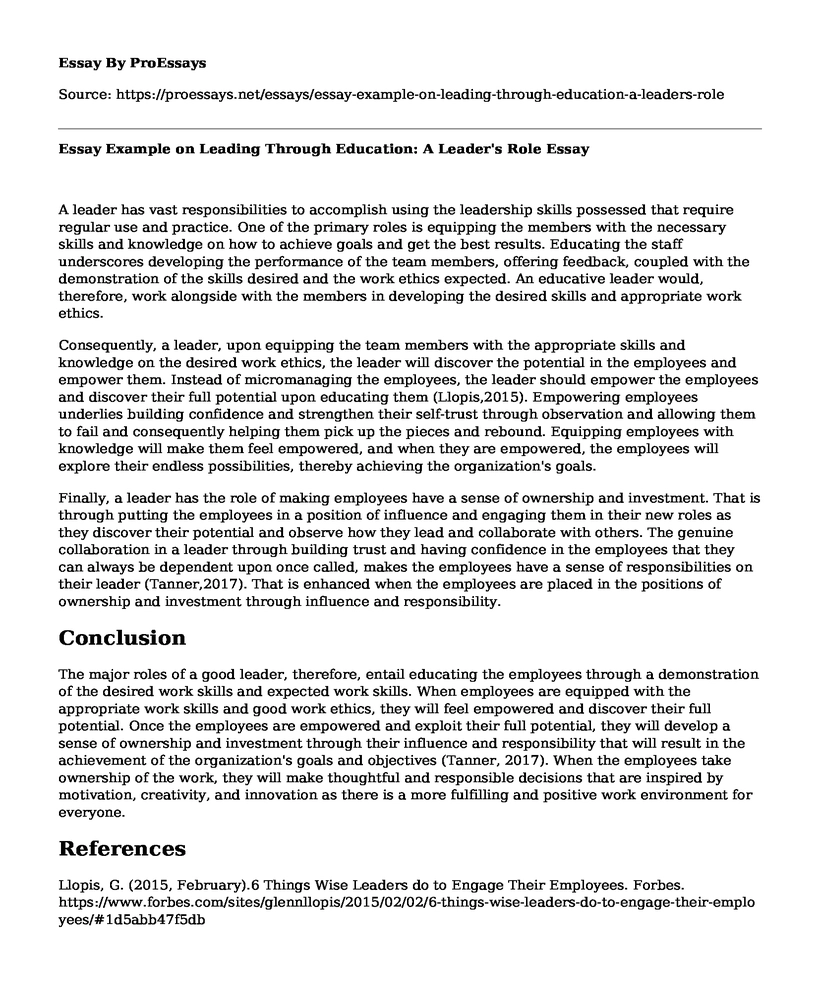A leader has vast responsibilities to accomplish using the leadership skills possessed that require regular use and practice. One of the primary roles is equipping the members with the necessary skills and knowledge on how to achieve goals and get the best results. Educating the staff underscores developing the performance of the team members, offering feedback, coupled with the demonstration of the skills desired and the work ethics expected. An educative leader would, therefore, work alongside with the members in developing the desired skills and appropriate work ethics.
Consequently, a leader, upon equipping the team members with the appropriate skills and knowledge on the desired work ethics, the leader will discover the potential in the employees and empower them. Instead of micromanaging the employees, the leader should empower the employees and discover their full potential upon educating them (Llopis,2015). Empowering employees underlies building confidence and strengthen their self-trust through observation and allowing them to fail and consequently helping them pick up the pieces and rebound. Equipping employees with knowledge will make them feel empowered, and when they are empowered, the employees will explore their endless possibilities, thereby achieving the organization's goals.
Finally, a leader has the role of making employees have a sense of ownership and investment. That is through putting the employees in a position of influence and engaging them in their new roles as they discover their potential and observe how they lead and collaborate with others. The genuine collaboration in a leader through building trust and having confidence in the employees that they can always be dependent upon once called, makes the employees have a sense of responsibilities on their leader (Tanner,2017). That is enhanced when the employees are placed in the positions of ownership and investment through influence and responsibility.
Conclusion
The major roles of a good leader, therefore, entail educating the employees through a demonstration of the desired work skills and expected work skills. When employees are equipped with the appropriate work skills and good work ethics, they will feel empowered and discover their full potential. Once the employees are empowered and exploit their full potential, they will develop a sense of ownership and investment through their influence and responsibility that will result in the achievement of the organization's goals and objectives (Tanner, 2017). When the employees take ownership of the work, they will make thoughtful and responsible decisions that are inspired by motivation, creativity, and innovation as there is a more fulfilling and positive work environment for everyone.
References
Llopis, G. (2015, February).6 Things Wise Leaders do to Engage Their Employees. Forbes. https://www.forbes.com/sites/glennllopis/2015/02/02/6-things-wise-leaders-do-to-engage-their-employees/#1d5abb47f5db
Tanner, W. (2017). Modern Manager: Here is How you Get Employees to Take Ownership ofTheir Work. Medium. https://medium.com/@warrentanner/heres-how-you-get-employeesto-take-ownership-over-their-work-ebe1f7ebf508
Cite this page
Essay Example on Leading Through Education: A Leader's Role. (2023, Aug 29). Retrieved from https://proessays.net/essays/essay-example-on-leading-through-education-a-leaders-role
If you are the original author of this essay and no longer wish to have it published on the ProEssays website, please click below to request its removal:
- The Role of Actively Open-Minded Thinking Annotated Bibliography
- Research Process for Stuyvesante Jewelry Inc
- The Importance of Groups to Christian Leadership Essay
- Decision Tree for Decision Making Essay Example
- Essay on Contingency Theory: No One-Size-Fits-All Leadership and Decision-Making
- Essay on Lev Vygotsky: Enhancing Cognitive-Developmental Abilities of Children
- Free Essay Example on Leadership







